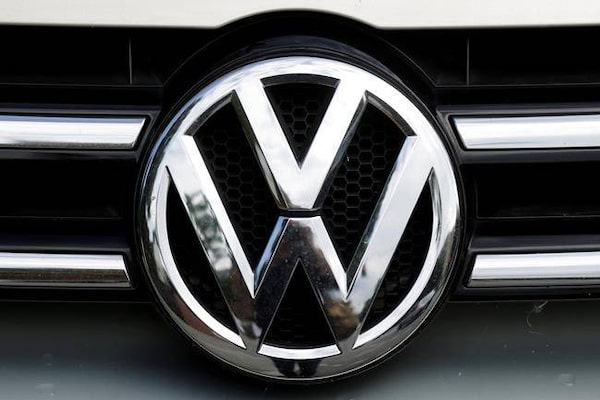
The brand logo of German car maker Volkswagen.The Associated Press
Environment Canada says it is pursuing a broad investigation of industry tampering with emission-devices in diesel vehicles, as two environmental groups sue the government to force a speedier resolution to the government's case against Volkswagen AG and its Canadian subsidiary.
In applications filed Wednesday in Ottawa, the organizations asked a federal judge to order Environment Minister Catherine McKenna to commence a ministerial investigation into the Volkswagen case and to provide regular updates to them on its status.
The department's enforcement branch launched its investigation nearly two years ago, but has not laid charges, despite Volkswagen's admission of guilt in a U.S. settlement last January. The applications to force a ministerial investigation with prescribed accountability requirements were filed by University of Ottawa law professor Amir Attaran on behalf of the Canadian Association of Physicians for the Environment and Environmental Defence.
Related: Volkswagen investigation could take years, Environment Canada says
The complainants "are concerned by the fact that, relative to the American environmental protection authorities who promptly investigated, prosecuted, and obtained billions of dollars in compensation against Volkswagen, to date [Environment and Climate Change Canada] has accomplished none of this," the complaint said.
"ECCC's indiligent [and indulgent] attitude toward enforcing air pollution standards affronts the rule of law, and puts the natural environment and even human life at risk."
However, a senior Environment Canada official said the department is working diligently on the investigation and will benefit from the conclusion of continuing criminal and civil actions in the United States and Europe.
"These things take a while and they take a while for a good reason in that we want to make sure that if, if we recommend charges to the public prosecution service that we do so with the fullest possible picture of what happened," Heather McCready, director general for environmental enforcement, said in an interview.
"And I think it would be a disservice to Canadians to do so prematurely if we think we may be able to provide a more complete picture at a later date."
Ms. McCready said the department has expanded its scope beyond Volkswagen, though she would not say what companies or individuals are being investigated.
"Yes, it's been broadened," she said. The additional investigations "are being handled separately [from Volkswagen] but at my level I'm looking at the whole picture."
In May, the U.S. Environmental Protection Agency filed suit against Fiat Chrysler Automobiles alleging that some 104,000 vehicles were equipped with "defeat devices" – software that shows the car is in compliance with emission standards under test conditions while it exceeds them when operating normally.
The EPA also won a settlement with Edge Products LLC for manufacturing and selling defeat-devices for diesel pickup trucks, while German authorities are reportedly investigating Mercedes-Benz auto maker Daimler AG over emission-controls tampering.
In January, Volkswagen reached a $4.3-billion (U.S.) settlement with the EPA in criminal and civil actions related to the emission devices, but six of its executives have been indicted. All told, the company faces more than $20-billion in penalties as a result of enforcement and class-action litigation. The company agreed to spend $1.5-billion on installation of electric-vehicles charging stations in the United States.
The emissions tampering can result in nitrous oxide emissions that are 35 times regulated standards. And that pollution poses a real health risk to citizens in areas of high-traffic density, said Kim Perrotta, executive director of the Canadian Association of Physicians for the Environment.
Ms. Perrotta said Volkswagen's admission of guilt in the United States should have paved the way for a quick resolution in Canada and her group wants to ensure the matter is not going to be "buried" without charges being laid.
"We can't understand why it is taking our government so long to act when this has all been settled in the United States already," she said. "The company has agreed it has done all these things; it accepted the facts as laid out by the EPA."
Ms. McCready said the EPA settlement was helpful, but Canadian laws differ and some elements of the case remain unresolved in the United States. She said a successful prosecution in Canada requires proof beyond a reasonable doubt.
Maximum fines for a first offence is $6-million and forfeiture of any profits earned as a result of the offence, though Mr. Attaran is urging the government to consider each vehicle sale to be a separate offence.
Under the Canadian Environmental Protection Act, a citizen can apply for a ministerial investigation, and the minister must acknowledge the application and "shall report to the applicant every 90 days on the progress of the investigation and the action, if any, that the minister has taken or proposes to take."
The Physicians for the Environment and Environmental Defence made such an application to Ms. McKenna, but were told the department was already investigating the matter, though the minister did initiate an investigation into the resale of vehicles that had been tampered with.
The groups' lawyer, Mr. Attaran, said the law is clear and does not give the minister the discretion to refuse to comply on the basis that her department has already begun an investigation.
"We expect the minister to follow the law and report her progress, or lack of it, transparently," Mr. Attaran said. "It is gobsmacking that she is more solicitous toward a foreign corporate criminal – after all, Volkswagen pleaded guilty [in the United States] – than she is toward Canadians who have concerns over their health and the environment."
Ms. McCready noted the act requires an investigation into all matters the minister deems necessary to determine the facts. "There is no requirement for an investigation into all matters that the applicant considers necessary."
In an e-mailed statement, Ms. McKenna noted the continuing investigation and said the government is committed to environmental enforcement and protection of Canadians. "Should ECCC officials find sufficient evidence of violations, enforcement action will be taken," she said.